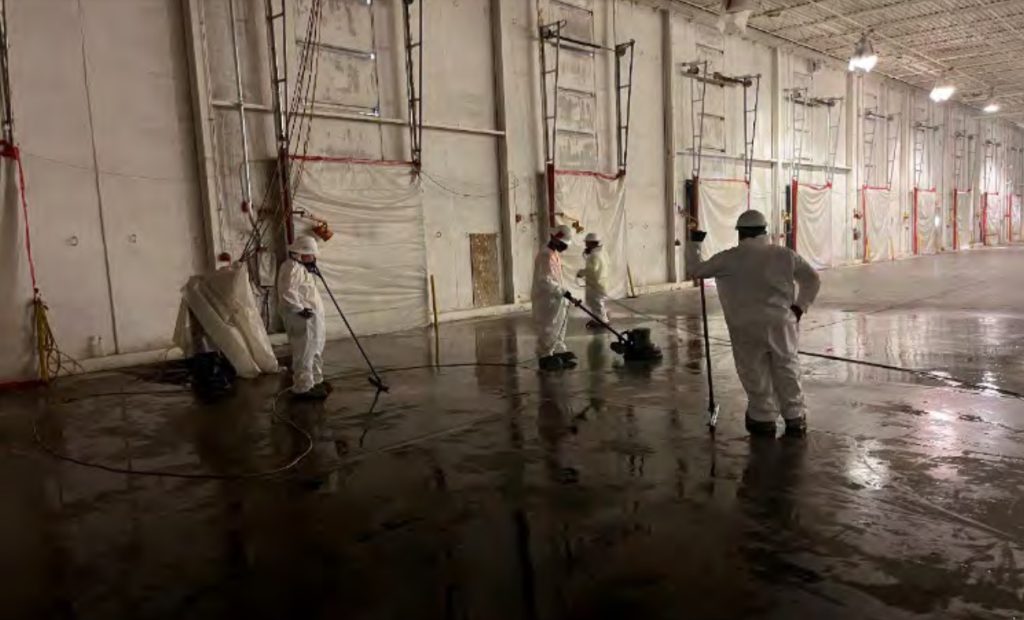
As CRT cleanup litigation reaches a conclusion in Ohio, a similar legal battle is ramping up in Arizona. | Courtesy of EnSafe
An $11.2 million cleanup, $9.6 million property sale and $1 million “orphan share” – those were just a few key figures to emerge as the years-long legal battle over Closed Loop’s massive stockpile concludes.
Closed Loop Refining and Recovery was paid to take hundreds of millions of pounds of CRT materials at its sites in Phoenix and Columbus, Ohio before the company failed in 2016, leaving property owners and public agencies to deal with cleaning up the mess.
Garrison Southfield Park, which owned two warehouses formerly occupied by Closed Loop, and Olymbec USA, which owned a third Closed Loop warehouse, sued dozens of CRT material suppliers, OEMs and others, arguing they’re legally required under federal Superfund law to help pay for the cleanups.
That case – in U.S. District Court for the Southern District of Ohio – has resulted in 39 legal settlements in which defendants agreed to pay over $16 million to help fund the cleanups, according to an updated E-Scrap News tally.
Now, the case appears to be coming to a close. Plaintiffs have dropped their allegations against two defendants and reached a settlement with a third. Meanwhile, the last of the warehouses has been cleaned up and sold.
Even as the Ohio case nears completion, the legal battle is heating up in Arizona, where landlords have filed a similar lawsuit in federal court against about 50 e-scrap companies that shipped CRT materials to the Phoenix sites, where cleanup is ongoing.
Last of the defendants
After the Ohio judge approves one final settlement, no defendants will remain in the Columbus court case. (Visit E-Scrap News’ new timeline feature to see our full coverage of the Closed Loop saga, including stories covering dozens of past legal settlements.)
As recently as last month, only three defendants remained: Robert A. Erie/E-World Recyclers, which was alleged to have shipped 11.6 million pounds of CRT materials to the sites; Westinghouse Digital, an Orange, Calif.-based OEM; and Moshe Silagi, who previously leased a Columbus warehouse to Closed Loop and later sold the property to Garrison Southfield Park.
In a Dec. 6 court filing, the plaintiffs asked to drop their case against Erie and his former company, E-World Recyclers. The company failed, and Erie served a sentence in federal prison after pleading guilty to conspiracy in a case related to trafficking imported counterfeit goods.
“Plaintiffs have no reason to believe that Defendants Erie or E-World have sufficient assets to warrant further pursuit of claims against them,” attorneys for the landlords wrote.
The case against Westinghouse Digital was dropped because the company appears to be defunct and couldn’t be served with court papers, the plaintiffs said.
Finally, on Dec. 22, the plaintiffs filed a motion to approve a settlement agreement with Silagi, who agreed to pay $200,000 to help fund the cleanups.
Cleanup costs are tallied
Closed Loop occupied three warehouses in Columbus: 2200 Fairwood Ave., owned by Olymbec USA, and 1655 Watkins Road and 1675 Watkins Road, contiguous warehouses that were owned by Garrison Southfield Park but have now been sold off.
Court documents indicate the final details on what it took to clear out those various properties:
- 2200 Fairwood Ave.: This space was cleaned up as of July 2021 at a cost of $4.06 million, according to the latest estimates. Olymbec USA still owns this property.
- 1655 Watkins Road: The warehouse was cleaned up as of January 2021 at a cost of $1.96 million. Garrison Southfield Park sold this warehouse for $5.4 million in July 2021.
- 1675 Watkins Road: The large warehouse was cleaned up as of August 2022 at a cost of about $11.21 million. Garrison Southfield Park sold this property on Dec. 13, 2022, for $9.6 million, according to Franklin County, Ohio property records. Garrison originally purchased 1675 Watkins Road in 2013 for $12 million.
Before the cleanup projects took place, consultants had estimated the sites would cost a combined $21.73 million to clear out. The latest post-project estimates are that the efforts cost $17.14 million, according to a Dec. 22 court filing, or about 21% less than originally anticipated.
Novotec Recycling and CompuPoint USA were paid a total of $13.77 million to remove and recycle or dispose of the Closed Loop CRT materials, with the vast majority of that money going to Columbus-based Novotec. Most of the abandoned material was a crushed up mix of leaded and unleaded glass that Novotec disposed of at a landfill, although some was unprocessed glass that CompuPoint USA was able to recycle.
It’s unclear whether Novotec, which made its business processing CRT glass into a feedstock for smelters, continues to operate. The company’s website has been suspended and its R2 certification voluntarily withdrawn. Its main phone number goes to a voicemail message indicating it’s now the number for Bolon Companies and Village Management Group, two companies that Tom Bolon, CEO of Novotec, is connected to.
Bolon didn’t respond to E-Scrap News’ requests for comment on the status of Novotec Recycling.
Despite the cleanup costs coming in lower than estimates, the landlords estimate they’re still on the hook for a substantial portion of expenses. In the Dec. 22 court filing, Garrison Southfield Park and Olymbec USA estimated there’s about $1 million in “orphan share” expenses that won’t be funded through settlements and they’ll have to eat.
That $1 million includes cleanup costs that are recoverable under the Comprehensive Environmental Response, Compensation, and Liability Act (CERCLA). It doesn’t include the landlords’ substantial investigatory and legal expenses over several years, or their lost rent opportunities.
With the end of the Ohio cleanups and case in sight, the attention shifts to Arizona, where landowners in October filed a similar lawsuit against dozens of e-scrap companies that sent material to Closed Loop’s Phoenix sites. Already, two defendants, California Electronic Asset Recovery (CEAR) of California and UNICOR (doing business as Federal Prison Industries), have agreed to pay $1.14 million and $995,000, respectively. With the new case in Arizona, eight companies that were sued and settled in the Columbus case are now being sued again.
More stories about courts/lawsuits
- Closed Loop companies hit with $3 million in Ohio penalties
- More processors settle in Iowa CRT stockpile case
- Guilty pleas in surplus equipment disposal scheme



